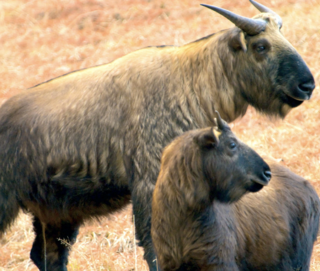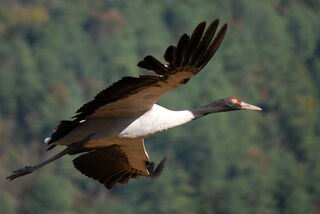Environment
Compassionate Conservation and Sustainability in Bhutan
A new book details how this small country has set an example for the world.
Posted April 14, 2021 Reviewed by Chloe Williams

When I ask people who are interested in conservation and environmental protection which country they would most like to visit, a large number, without hesitation, say Bhutan. I agree, and I'm pleased to offer an on-the-ground and up-to-date interview with Dr. Michael Tobias, one of the authors along with Dr. Ugyen Tshewang and Jane Gray Morrison of a new book called Bhutan: Conservation and Environmental Protection in the Himalayas. This landmark work recognizes nonhumans as stakeholders in conservation protocols and offers a detailed summary of how this small country has established stringent conservation practices that set examples for the rest of the world to follow.1,2
Marc Bekoff: Why did you write this book?
Michael Tobias: It is really the culmination of many decades of field research. Dr. Tshewang was actually the first Bhutanese to obtain a Ph.D. in the natural sciences, and later–after a most distinguished scientific and governmental career in Bhutan–would become the Secretary of the National Environment Commission, the country’s apex institution in the environmental sector. Jane and I have been traveling back and forth throughout the Himalayas for over half-century.
I was first in Bhutan in the Winter of 1974/75. This country represents to many a kind of ecological Shangri-la–and it is, in many respects–a definitively Buddhist, carbon-neutral country with over 70% of its primary forest canopies protected. Although its population is small, approximately 760,000, it has managed in many respects to champion many of the most ecologically sustainable policies of any country. But Bhutan cannot rest on its laurels. There are dark clouds ahead and Dr. Ugyen Tshewang, Jane Gray Morrison and I wanted to bring the urgent imperatives to the front and center, most particularly in three areas: climate change, animal liberation, and the safeguarding of Bhutan’s exquisite composite of endemic biological phyla.
This book could not have come into being were it not for the generous and brilliant collaboration of 61 consultants from every ecological sector within Bhutan, as well as a technical expert working group under the working title of ACPB–Assessment of Conservation Priorities for Bhutan, initially developed by the U.S.-based Dancing Star Foundation. The ACPB group comprised 12 leading scientists in the country.
On top of that, we were deeply honored to have the embrace of His Excellency Lyonchen (Dr.) Lotay Tshjering, Prime Minister of the Royal Government of Bhutan, who wrote the foreword to the book; and His Excellency Lyonpo Yeshey Penjore, Minister for Agriculture and Forests of the Royal Government of Bhutan, who wrote the preface.
MB: How does your book relate to your backgrounds and general areas of interest?
MT: All three of us have specialized for most of our careers in mountain ecosystems and animal protection, through the lenses of ethics, and biocultural sustainability.
MB: Who is your intended audience?
MT: We feel that those interested in the future of life on earth, and how humanity intends to address its currently unsustainable course, will come to this book knowing that a democratic society like Bhutan, which has for many decades demonstrated some of the most stringent, pragmatic and compassionate conservation of any nation, is focused upon doing even better. Making adjustments along the way towards a future that will protect and revere all of nature is the sign of a sane individual, and of a rational nation, particularly at this point in time of the 21st century Anthropocene, the sixth spasm of global extinctions in biological annals.
MB: What are some of the topics that are woven into your book and what are some of your major messages?
MT: Perhaps the two most significant policy recommendations in the book are: (1) a Gross National Happiness Index for Animals, which, in essence, means, a concerted Bhutanese set of policies that will focus on how to ensure a nation that continues long into the future to revere all species, all biomes, and to make fundamental adjustments so as to perpetuate animal and plant rights as a fundamental quality of a constitutional democracy, and (2) a proposed Himalayan ark within a Bhutanese glacier, a gene bank representing all those critical endemic species to Bhutan which, in the worst-case scenario, might need to be cryogenically preserved for a rainy day, if you will.
MB: How does your book differ from others that are concerned with some of the same general topics?
MT: In an earlier book, Bionomics in the Dragon Kingdom: Ecology, Economics and Ethics in Bhutan, the three of us (with a foreword by the Former Supreme Court Justice of Bhutan, His Lordship Lyonpo Sonam Tobgye), examined the rudiments of compassionate conservation in the country. We presented a highly accessible overview of the national park system, protected areas, protected corridors, and the legal and geopolitical infrastructure and challenges to the country. In 2008, our book Sanctuary: Global Oases of Innocence, had looked schematically at Bhutanese ecological ethics in the context of some 23 other nations in the world.

Our latest work, Bhutan: Conservation and Environmental Protection in the Himalayas, is an in-depth, up-to-the-minute, 400-page heavily illustrated overview of an abundance of new research that includes a substantial commitment to GIS imagery outlining the abundance and distribution of rare and threatened species, as well as a stark assessment of those areas regarding taxonomic biases, pollution, immuno-contraception, climate change and with it the significant threat of GLOF–glacial lake outburst flood(ing)–that poses a threat to the largest expanse of watersheds in the world–the Himalayas. Its waters feed well more than 1 billion downstream recipients.
MB: What are some of your current projects?
MT: Dr. Tshewang continues tirelessly to advocate for sustainable, compassionate, ecosystem protections in his country. Tobias and Morrison and the Dancing Star Foundation continue our ecological work in the U.S. and throughout the world. Tobias and Morrison have a new book coming out from Springer later this Spring, On the Nature of Ecological Paradox. And NOVA Science Publishers recently brought out Tobias’ The Earth in Fragments: A Memoir.
References
Notes
1) Chapter 3 of Bhutan: Conservation and Environmental Protection in the Himalayas titled "Non-Violent Techniques for Human-Wildlife Conflict Resolution" is available here.
2) Ugyen Tshewang is the first Bhutanese scientist who received his PhD in natural science and ecodynamics affecting livestock and populations at the University of Queensland, Australia. During his long illustrious career in the Royal Government of Bhutan, he was the Secretary of National Environment Commission–the country’s apex institution of environment sector, founding Director of the National Biodiversity Centre establishing the National Gene Bank, the National Herbarium and Botanic Gardens; and served as the Governor of the country’s eastern-most province, Trashiyangtse. Besides his numerous research publications, he led the task force representing multiple stakeholders to develop the Biodiversity Act and various environmental laws and policies of the country. Dr Tshewang was also the national focal point for Multilateral Environment Agreements dealing with the United Nation Framework Convention on Climate Change (UNFCCC), the Convention on Biological Diversity (CBD), the Basel Convention and the Montreal Protocol.
Michael Charles Tobias is a global ecologist, anthropologist, historian, explorer, author and filmmaker. He obtained his Ph.D. in the Department of History of Consciousness from the University of California-Santa Cruz and has conducted field-research in nearly 100 countries. Tobias is the author of more than 60 books (both fiction and non-fiction, as well as several edited anthologies). In addition to his numerous books and published research papers, he has written, directed, produced, executive produced or co-executive produced well over 100 films–TV series, documentaries and dramas, most pertaining to environmental, cultural, social or scientific issues. A former Professor at Dartmouth, the University of California-Santa Barbara, the University of New Mexico-Albuquerque and elsewhere. In 1996, Dr Tobias received the "Courage of Conscience Award" for his commitment to nature and non-violence. In 2004 he was the recipient of the Parabola Focus Award for his long-standing body of work aimed at creating a better world. Dr. Tobias is the long-time President of the Dancing Star Foundation.
Jane Gray Morrison is an ecologist whose work has taken her to over 30 countries. As a filmmaker, Ms. Morrison has produced numerous films for such networks as Discovery, PBS (where she also Co-Directed "A Day in the Life of Ireland" for Irish Television and WNET/New York), “Hotspots" and Turner Broadcasting for which she served as Senior Producer for "Voice of the Planet," a 10-hour dramatic series based upon the history of life on Earth. Her books include Sanctuary: Global Oases of Innocence, Donkey: The Mystique of Equus Asinus, God’s Country: The New Zealand Factor; and No Vacancy. She has co-written five books published by Springer. Since 1999, Jane Morrison has served as the Executive Vice President of Dancing Star Foundation a non-profit organization that focuses on the interdisciplinary humanities and social justice movements as they concern humankind's relationship to the natural world.
Batavia, Chelsea et al. Emotion as a source of moral understanding in conservation. Conservation Biology, 2021.
Bekoff, Marc. Anthrozoology: Embracing Co-existence in the Anthropocene. (A book by Michael Tobias and Jane Morrison stresses the need for universal coherence.)
Millbrooke, Anne. Wildlife: The Local 'Stakeholders' Often Given No Voice Or Forgotten. Mountain Journal, March 14, 2021.




